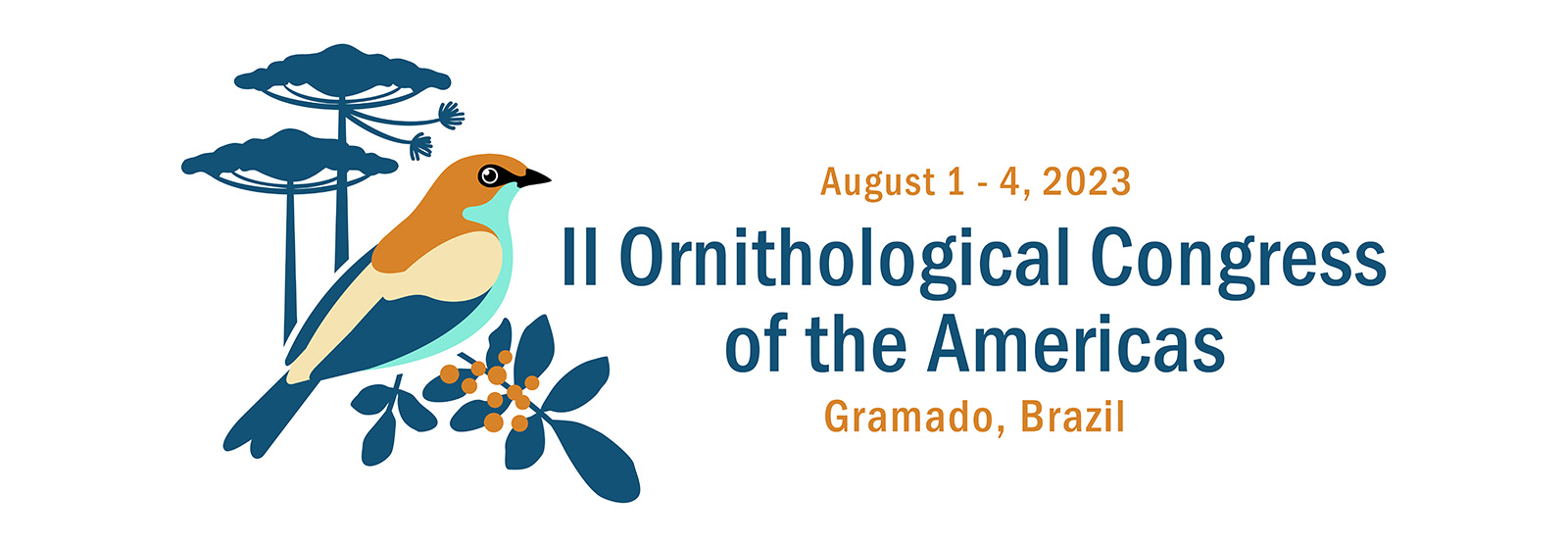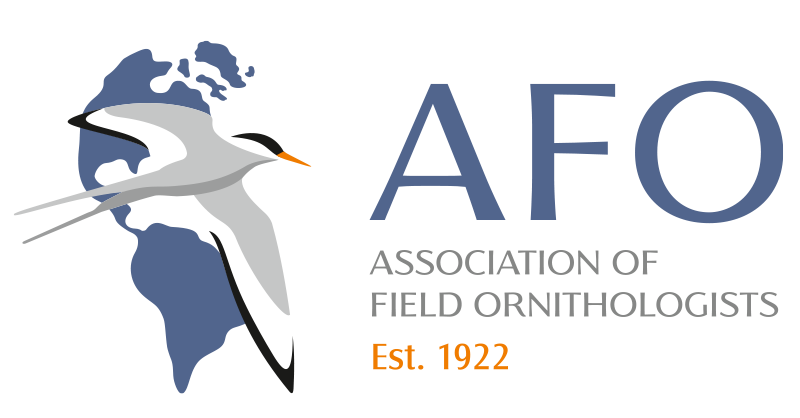In 2017, AFO partnered with Sociedade Brasileira de Ornitologia (SBO) and Aves Argentinas to hold a joint conference of the Americas in the Neotropics. We are excited to continue this tradition in 2023 with the second congress planned to take place in Gramado, Brazil. We look forward to sharing more details as this exciting event develops.
Please note, our societies had originally planned for this meeting to take place in Santa Cruz de la Sierra, Bolivia, but due to socio-political issues, we have have transitioned to Gramado, Brazil. We are excited for this event in Gramado, and we look forward to returning to Santa Cruz de la Sierra for a future Congress.

2nd Ornithological Congress of the Americas
Location:
Gramado, Brazil
Dates:
1-4 August, 2023
Partner Societies:
- Association of Field Ornithologists
- Neotropical Ornithological Society
- Sociedade Brasileira de Ornitologia
Important Dates:
- April 14:
– Deadline for (AFO) travel award applications (note: awards from other societies had different deadlines/requirements). Apply online here: https://forms.gle/31AuSvh7T3MHguRt9 - April 15:
– Super-early-bird registration closes
– Deadline for proposals for round-tables and symposia - May 1:
– Deadline for workshop proposals - May 15:
– Early-bird registration closes
– Deadline for abstracts for oral and poster presentation - July 27:
– Advance registration closes (registration will be available on site after this date)
We look forward to sharing more details about this exciting event as they develop.
1st Ornithological Congress of the Americas

Location:
Puerto Iguazú, Misiones Province, Argentina
Dates:
August 8-11, 2017 (with workshops Aug 7-8 and field trips Aug 12-13)
Partner Societies:
- Association of Field Ornithologists
- Aves Argentinas
- Sociedade Brasileira de Ornitologia
Venue:
Centro de Eventos y Convenciones del Iguazú
Lodging:
Amerian Portal del Iguazú Hotel
Program:
Summary:
This was the Association of Field Ornithologists’ XCV meeting, the XXIV Congresso Brasileiro de Ornitología and the XVII Reunión Argentina de Ornitología. We also celebrated the 100 years of Aves Argentinas.
The congress was attended by over 540 ornithologists from 14 countries of which approximately 300 were students! The event was widely considered an overwhelming success with its importance recognized not only by the societies and attendees, but also by the broader community–in recognition of the congress, Iguazu National Park ran a concurrent photography exhibit showcasing local bird species, and the congress was covered by the local TV network. It was a historic meeting for the AFO and only the third time that our society has co-organized a meeting in Latin America. The four-day meeting was packed with exciting events, stimulating science, and plenty of opportunities for making new friends and catching up with old ones! We were incredibly fortunate to host seven renowned ornithologists, who gave plenaries covering a wide range of fascinating subjects:

- Patricia Brennan (Mount Holyoke College, USA) – Genital evolution in birds: losing the penis and winning the battle
- Scott Edwards (Harvard University, USA) – Genomic drivers of evolutionary change: micro- and macroevolutionary examples across the avian tree of life
- John Fitzpatrick (Cornell University, USA) – Emerging roles for citizen science in understanding bird distributions and in conservation
- Sergio Lambertucci (CONICET-Universidad Nacional del Comahue, Argentina) – Sharing the air with wildlife: patterns, processes and conservation in 3D
- Miguel Marini (Universidade de Brasilia,Brazil) – Climate change and Neotropical birds: current knowledge and gaps
- Thomas Martin (University of Montana, USA) – On the importance of studying natural history while thinking about evolutionary ecology theory and physiology principles to advance understanding of life history variation
- Cristina Miyaki (Universidade de Sao Paulo, Brazil) – Phylogeography of birds: revealing the biogeographical history of the Atlantic Forest
The congress agenda included a full schedule of symposia spanning a variety of topics, including ‘Movement ecology of South American birds: causes and consequences‘, ‘The utility of citizen science data for bird conservation across the Americas’, and ‘Applied statistics for ornithological studies: current developments and insights’. It also provided numerous workshops including ‘warbleR: a package for streamlined bioacoustic analyses in R’, ‘How to talk about Science with non-scientists?’, and ‘Introduction to GIS and Ecological Niche Modeling for use of Bird Databases’.
AFO undergraduate student oral presentation awards were given to Thays Vernoica Prestes (Behavioral responses of urban birds to anthropogenic disturbance in green areas in Curtiba, Paraná, Brazil), Waleska E. dos Santos Barbosa (Molecular systematic and biogeography of the Synallaxis rutilans species complex), Paulo Sergio Pereira de Amorim (Experimental influence of a non-vocal signal on the vigilance of the Scaled Dove).
Undergraduate poster awards were given to Bruno Riovitti (Lower begging efficiency can constrain host use in the specialist Screaming Cowbird), Florencia E. Curzel (Wooded street use by birds in Buenos Aires city: the role of local characteristics and urban parks connectivity), and Facundo Fermandez-Duque (Plumage ornamentation as a potential driver of behavioral differences in a dichromatic passerine).
AFO graduate student oral presentation awards were given to Young Ha Suh (Potential mechanisms that influence first-breeding site selection and quality), Pedro Diniz (Duetting, extra-pair paternity and reproductive success in the Rufous Hornero), and Laura Maria Schaedler (Singing in unison: duets and choruses in Blue Manakins).

Graduate poster awards were given to Cecília Licarião Luna (Body condition and abundance of endemic passerines of Fernando de Norohna, Brazil), Juan Manuel Rojas Ripari (Response to nest predation risk in a cooperative breeder the Grayish Baywing), and Luiz Henrique Varzinczak (Assessing nestedness for insular bird assemblages: contrasting island area and isolation for multiple dimensions of biodiversity)—congratulations to all award winners!!
Evenings were a great time to experience local cuisine, cultural traditions, and special events including ‘Jacana Jacana’, a tradition of the Sociedade Brasileira de Ornitologia in which teams act out the behavior of their chosen bird species. This year’s event was won by a team from the Laboratorio de Biología de Aves, IADIZA-CCT-Conicet Mendoza for their rendition of courting flamingos! The congress also marked the 100th anniversary of Aves Argentinas who hosted a centenary party to celebrate.
Congress attendees were treated to plentiful birding opportunities with a wide range of species seen during the morning bird walks alone! Local birding sites in Puerto Iguazú, including Jardin de los Picaflores, provided exceptional views of hummingbirds, euphonias, and tanagers, amongst other species. The surrounding area offered unique opportunities to experience local flora and fauna—the spectacular Iguazú National Park was a highlight with breathtaking views of Iguazu Falls, one of the world’s Seven Natural Wonders and a UNESCO World Heritage Site. Here, attendees saw a diversity of species including Great Dusky Swift, Toco Toucan, Blond-crested Woodpecker, Eared Pygmy-Tyrant, Plush-crested Jay, and the endangered Black-fronted Piping-Guan. Combined with the events of the Congress, the birds and scenic attractions made for a particularly memorable meeting.

